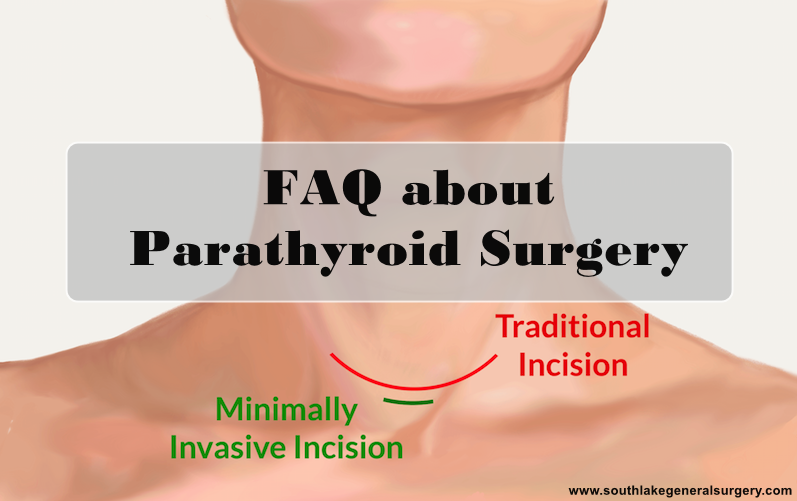FAQs about Parathyroid Surgery are common among patients who are contemplating this procedure. Some of the most common questions include:
How long will it take to recover?
It would take about 1-2weeks approximately to return to work. Recovery from Laparoscopic surgery is fast and pain after surgery is minimal. You might feel weakness, a sore throat, and a generalized soreness which typically settles in a week or two.
When can I go back to work?
You may resume your work whenever you feel like you can. Many individuals can resume their office after a couple of days and a few take about 1-2 weeks.
When can I eat and when can I resume my normal diet?
You may eat after surgery. There are no limitations on what you can eat or drink. A few people experience a sore throat and would like to have a liquid diet for a couple of days. It is suggested that you maintain a strategic distance from heavy, oily, or spicy food for the initial few days.
What activities would I be able to do?
You may resume your regular activities after surgery. There are no limitations. You may feel more exhausted than expected which should require a reasonable time after surgery. Going slow on your activities, such as walking, help increase the rate of recovery. A gentle neck workout will help prevent any sort of stiffness or cramp on the neck.
When would I be able to speak normally?
You may speak right after your surgery. You may feel a sore throat however talking is profoundly encouraged.
How would I take care of the dressing over my surgical area?
Generally, Steri-Strips are put over the incision. These are small strips of white tape which help to secure the incision. The Steri-Strips ought to stay intact for around 7-10 days. You may take them off after a week or later.
When would I be able to take a shower?
You may shower 24-48 hours after surgery. We suggest that you leave the Steri-Strips as it is while you shower and slightly dry them with a towel when you are done. Avoid swimming and hot tubs at least for 2 weeks after surgery.
What would I take for pain?
Once you are discharged from the hospital, your doctor will give you a prescription for medicines that will also include pain medicines. Try not to take pain drugs and Tylenol together. The pain medicine contains Tylenol. In the event that you wish, you may take ibuprofen, yet no sooner than 5 days after the medical procedure.
How a scar would look like?
Most scars will turn out soft, level white lines after some time.
For what reason is my scar appear red?
You will observe during the initial weeks of surgery, the scar area will get red, firm, and hard. Scars at times appear to turn out to be worse before they show signs of improvement. This is common. After 6 weeks or so, the scar will start to “mature”. This implies the scar will mollify and turn out to be less red. Throughout the following 4 months, the scar will gradually turn out to be soft and won’t be as red. It might take as long as a year for the scar to mature.
When will the scars disappear?
A scar is typically permanent. As the scar becomes milder and less red, it will start to mix into the skin around the scar. It will turn out to be less visible.
Does applying Vitamin E oil to the scar help to disappear?
It isn’t known without a doubt if Vitamin E oil assists scars with healing quicker or makes them less visible and it won’t hurt. Applying any oil or moisturizer that can add moisture to the skin will help. Fourteen days after surgery, it is a smart thought to massage a scar gently however firmly for 5 minutes, two to four times each day. Use oil or moisturizer of your own choice while doing the massage on scars.
What about the effects of sunlight on scars?
It is necessary to keep out of direct sunlight for as long as one year after surgery. A lot of direct sunlight makes a scar darker in shading than the skin around the scar. It is recommended to use sunscreen with at any rate SPF 15 when outside.
What are the risks and complications associated with parathyroid surgery?
The risks and problems associated with parathyroid surgery are similar to those of any other type of surgery. Hypocalcemia (low blood calcium levels) is one possible side effect, along with bleeding, infection, injury to nearby structures like the nerves and vocal cords, and other problems.
However, these risks are rare, and the vast majority of patients make a full, painless recovery. It is important to discuss any concerns with the medical team and carefully follow all pre-and post-operative instructions to minimize the risk of complications.
Finding Parathyroid Surgeon
When searching for the best parathyroid surgeon, Southlake, Texas for a procedure, several factors should be considered. Among the most important are experience, training, and reputation. It is essential to choose a surgeon who is board-certified and has extensive experience performing parathyroid surgeries. Checking for personal recommendations from trusted sources such as friends, family, and medical professionals is also helpful.
Appointment
If you have any further queries regarding parathyroid surgery, please contact us @ +1 (817) 748-0200. You can also make an online appointment with us.

